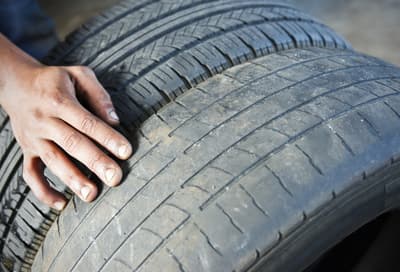How Long Do Tyres Last?

Tyres are the only point of contact between your vehicle and the road, providing grip with the road surface and keeping you in control of your vehicle no matter what the conditions. They take constant damage in the process of doing this, and gradually degrade over time.
The same friction that creates traction between your car and the road also erodes the surface of your tyres, and the more of the tyre surface that gets worn away, the worse your tyres are at doing their job.
To make sure you’re always as safe as possible on the road, both for yourself and other drivers, it’s essential to replace your tyres when they degrade too much. It’s not always clear how long tyres last, however, especially since it depends so heavily on how much you drive on them.
We’re here to help you figure out how long your tyres will last, in terms of both time and mileage.
Average tyre life
It’s practically impossible to accurately predict what the lifespan of a tyre is without more information, because there are so many variables involved. Budget tyres won’t last as long as premium tyres, for example, and tyres will degrade faster the more you drive on them. What condition road surface you drive on will also impact tyre longevity, as will how well you look after your tyres.
Despite all these caveats, the general rule of thumb is that a tyre could last up to 10 years, if it doesn’t degrade past the legal limit in that time.
However, unless you use your vehicle very infrequently, it’s highly likely that the amount of mileage you’d cover in that time would mean your tyres need replacing much sooner. Experts also suggest that you should have your tyres checked professionally once they’re 5 years old, and every year afterwards.
How many miles do tyres last?
The more realistic method of figuring out how long your tyres will last is to base it on how many miles they’ll drive. The stresses of driving cause tyre wear, with friction and heat eroding the tyre’s surface down and reducing the tread depth. Also, the more you drive, the more likely you are to sustain tyre damage such as bulging sidewalls, cracks, or punctures.
Generally, in average conditions and circumstances, you can expect your front car tyres to last around 20,000 miles, and your rear tyres, which take less of the strain of driving, could last double that.
These numbers are nowhere near exact, however, and they will vary drastically based on a huge number of factors so you shouldn’t expect them to apply meaningfully to your vehicle.
How to get the most out of your tyres
While there’s no specific answer to the question of how long tyres last, there are some certainties when it comes to getting the most out of your tyres. The following tips will make sure your tyres last as long as possible and stay in good condition throughout:
Proper inflation
Tyres should always be properly inflated as both under-inflation and over-inflation can reduce their lifespan. An under-inflated tyre will have increased rolling resistance as more of the tyre will be in contact with the road. This means more friction, which in turn means faster wear.
An over-inflated tyre will create conditions of high air pressure, which then means that the tyre’s footprint on the road is overly focused on the centre of the surface. This can cause uneven tyre wear in the long term, with the tread depth at the centre of the tyre reducing more quickly than the tread depth at the edges.
Wheel balancing
Over time, car wheels can be offset by bumps and regular use. When wheels are unbalanced, their weight is distributed unevenly across the wheel axle, which in turn causes wobbling during driving. This wobbling can create uneven tyre wear, as some parts of the tyres will be in contact with the road more frequently than others.
Wheel balancing counters this effect by placing offsetting weights at the right locations on your wheels, rebalancing them on their axle. Getting your wheels regularly balanced will ensure tyre longevity.
Driving Style
How you drive can have a large impact on how long your tyres last, with aggressive acceleration and braking both leading to faster tyre wear. Adapting your driving style to focus on controlled movements and speed changes will help to extend the lifespan of your tyres, reducing unnecessary wear from excess friction with the road surface.
Rotate your wheels
As most modern cars have front wheel drive, meaning the power from the engine is transferred to the front wheels only, the tyres at the front of your car are likely to degrade more quickly than those at the back. To alleviate the uneven wear this can cause and to extend the lifespan of your tyres, you can rotate the tyres between the front and back wheels regularly.
15 May 2019
Did you enjoy this blog post?
|
117 people found this review helpful
